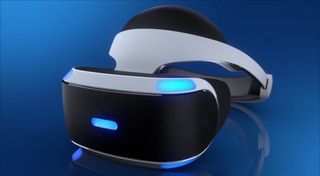VR Games At E3 Were Making People Sick, Get The Details

One of the big issues we've been writing about here at Cinema Blend in regards to VR technology is user sickness and nausea. It's probably going to be one of the biggest factors as VR continues to hit the consumer market. Well, that very issue was front and center at this year's E3 with the PlayStation VR, which is due for release later this year on October 13th.
According to Engadget the VR presence at this year's E3 was very palpable. However, despite all the new games being announced and all the exciting new trends happening at this year's event surrounding virtual reality, there were some issues with people getting VR sickness due to a very prominent issue: the frame-rate.
Engadget's Sean Buckley wrote...
Even players who've spent countless hours in virtual reality (like our own Jess Conditt) found themselves on the verge of puking while playing Resident Evil 7: Biohazard -- and it wasn't because of the horror game's gory visuals either. No, it's that the game is pushing the limits of PlayStation's hardware, barely managing to run at the minimum 60 frames per second required for PSVR. The problem? Every other VR headset on the market recommends that games run at a minimum of 90 fps.
Technically the games can run at 60 frames per second but they must stay at 60 frames per second or higher. The problem in a lot of games is that they claim to run at 60fps but they're usually running at a max of 60fps with regular drops. If you pay attention to any of Digital Foundry's FPS tests for games, most games claiming to run at 60fps average around 45fps with a peak consistent frame-rate of around 58fps. Occasionally the game will hit and maintain 60fps.
For VR the requirement to hit 90fps isn't to actually run at 90fps but to grant leeway for staying above 60fps. Most games running at 90fps may not be able to maintain that at the minimum specs but they may be able to stay above 60fps, which is the absolute bare minimum in which you should be able to run a VR app.
This is also why the Oculus Rift and the HTC Vive have such ridiculously high system requirements. At the very least you'll need hardware that can maintain 60fps no matter what, but the goal should be 90fps for a comfortable playing experience.
In the case of Resident Evil 7, the game was not hitting 60fps during the PlayStation VR demos and in result, the frame drops caused literal sickness due to the fact that the brain is receiving mixed information about the perceived acceleration and deceleration of the movements being rendered through the headset and the lack of movement by the human body. The ocular disparity causes what Engadget is labeling as "simulator sickness".
CINEMABLEND NEWSLETTER
Your Daily Blend of Entertainment News
This has been a common problem with VR devices and it's the main reason why Sony has a mandated certification process specifically for PlayStation VR apps, requiring them to meet and maintain 60fps at the bare minimum. This is not 60fps with drops, 60fps with stutter or 60fps with tearing. This is 60fps or bust; your game will not get certified.
Sony has also implemented a dual frame refresh feature called reprojection, by embedding frames in between the refresh of 60fps titles in order to imitate a 120fps runtime environment. Now if a game can manage to stay above 60fps at all times then the dual refresh rate would make the PlayStation VR experience much more enjoyable.
However, the limited PS4 hardware is going to have a tough time hitting 60fps on some games, and there's going to be a fine balancing act between maintaining resolution (to avoid eye strain) and frame-rate (to avoid VR sickness) and keeping the details of the game at a visually pleasing level.
Sony expects 50 games to be out during the launch quarter of the PSVR, but they're going to need to pull some optimization magic to make sure they aren't driving customers away with poorly optimized VR experiences.
For the most part, games like Resident Evil 7 will have to scale back on graphical details if they want to hit that 60fps benchmark before the release date arrives, otherwise there's going to be a lot of serious issues when players plop on the PlayStation VR headset and have to deal with frame-rate drops that could lead to nausea, fainting or vomiting.
Staff Writer at CinemaBlend.
Most Popular






